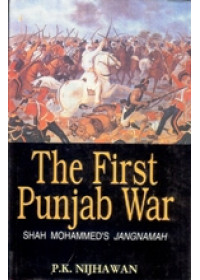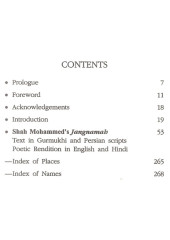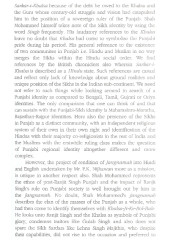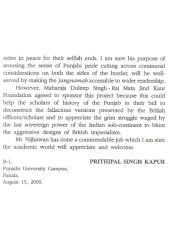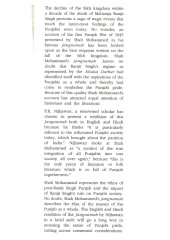Monday to Saturday - 10:00 Am to 9 PM
Now Enjoy Bulk Discounts on Books as Mentioned Below
These Discounts are in addition to the Discounts on Individual Books (Visible as Bulk Discount for Books in Cart)
Extra 10% Off If Books Purchased Exceeds Rs 3000 or 75 USD or 60 GBP or 60 Euro or 100 AUD or 100 CAD
Extra 15% Off If Books Purchased Exceeds Rs 6000 or 150 USD or 120 GBP or 120 Euro or 200 AUD or 200 CAD
Extra 20% Off If Books Purchased Exceeds Rs 15000 or 225 USD or 180 GBP or 180 Euro or 300 AUD or 300 CAD
Extra 25% Off If Books Purchased Exceeds Rs 30000 or 300 USD or 240 GBP or 240 Euro or 400 AUD or 400 CAD
Introduction To 'The First Punjab War - Shah Mohammad's Jangnamah' By P.K. Nijhawan
The decline of the Sikh kingdom within a decade of the death of Maharaja Ranjit Singh presents a saga of tragic events that touch the inner-most feelings of the Punjabis even today. No wonder, an account of the first Punjab war of 1845 presented by Shah Mohammad in his famous Jangnamah has been looked upon as the best requiem written on the fall of the Sikh kingdom. Shah Mohammed's Jangnamah leaves no doubt that Ranjit Singh's regime as represented by the Khalsa Darbar had identified itself with the aspirations of the Punjabis as a whole and thereby had come to symbolise the Punjabi pride. Because of this quality Shah Mohammed's account has attracted equal attention of hostorians and the literateur.
P.K. Nijhawan, a renowned scholar has chosen tp present rendition of this Jangnamah both in English and Hindi because he thinks "it is particularly relevant to the trifurcated Punjabi society today, which brought about the partition of India". Nijhawan looks at Shah Mohammed as "a symbol of the true integration of all Punjabis into one society, all over again," because "this is the only piece of literature which is so full of Punjabi togetherness."
Shah Mohammed represents the ethos of post-Ranjit Singh Punjab and the impact of Ranjit Singh's rule on Punjabi society. No doubt, Shah Mohammed's Jangnamah describes the elan of the masses of the Punjab as a whole. The English and Hindi rendition of the Jangnamah by Nijhawan in a lucid style will go a long way in arousing the sense of Punjabi pride, cutting across communal considerations.
About the Author Of 'The First Punjab War - Shah Mohammad's Jangnamah'
P.K. Nijhawan, (Born 1927) started his career with Public Relations, Punjab and shifted on to the Govt. of India to pursue a long career with the Ministry of Family Planning. His journey to U.S.A. on official assignments and stints with journalism facilitated the effulgence of his talent as a literateur. Since then, has profusely written both in English and Hindi on a variety od subjects viz. current affairs, poetry, criticism, translation, thought and fiction. His Sri Guru Gobind Gita and Hinduism Redefined earned him fame within India and abroad. But he likes to describe himself as a mauverick of sort-mauverick of love, life and literature.
His life-long quest has been to be well-known as a good Punjabi. That's why, when he came across Shah Mohammed's Jangnamah, he found a model in it and decided to render it into English and Hindi Poetry to enable most of the Punjabis to read and appreciate it and glorify in the name of Punjabi culture. He also plans to render the Heer Waris Shah both in English and Hindi verse.
Prologue To 'The First Punjab War - Shah Mohammad's Jangnamah' By P.K. Nijhawan
The decline of the Sikh kingdom within a decade of the death of Maharaja Ranjit Singh presents a saga of tragic events that touch the inner-most feelings of the Punjabis even today. No wonder, an account of the first Punjab War of 1845 presented by Shah Mohammed in his famous Jangnamah has been looked upon as the best requiem written on the fall of the Sikh kingdom. Shah Mohammed's Jangnamah leaves no doubt that Ranjit Singh's regime as represented by the Khalsa Darbar had identified itself with the aspirations of the Punjabis as a whole and thereby come to symbolise the Punjabi pride. Because of this quality Shah Mohammed's account has attracted equal attention of historians and the literateur. The doyen of Punjab history, Professor Sita Ram Kohli cast a critical look on this Jangnamah in 1956, when he edited the text by appending a scholarly introduction to it. He accepts that Shah Mohammed belonged to the lineage of Sultan Mahmud, an artillery officer of Maharaja Ranjit Singh and was well-educated. Professor Kohli affirms that the narrative given by Shah Mohammed presents a balanced and unbiased account of the events. Still, the author of the Jangnamah also does not hesitate to pass his own judgement on men and events. The correctness of the events enumerated by Shah Mohammed remains unassailable which makes it a first-rate historical source. Sant Singh Sekhon, a celebrated Punjabi literary critic, looks at the Jangnamah as a literary piece. He says: "The skill and technical virtuosity in Jangnamah Hind-Punjab (the original name of Jangnamah by Shah Mohammed) is by no means consistently uniform. While mostly the lines show a felicituous style and skill in expression, there are places where expresssion just fills the gaps, which indicate that the over-all felicity of expression comes more from nature than from art. Where nature sustains the expression, it is really perfect and such expressions are almost on the lips of a large number of Sikhs (Punjabis?) even to this day". (A History of Punjabi Literature, Vol. II, 128-129, P.U.P., 1996).
P.K. Nijhawan has chosen to present a rendition of this Jangnamah both in English and Hindi because "it is particularly relevant to the trifurcated Punjabi society today, which brought about the partition of Indian " (See Introduction). Nijhawan looks at Shah Mohammed as "a symbol of true integration of all Punjabis into one society, all over again", because " this is the only piece of literature or folk literature which is so full of Punjabi togetherness". It is out of this frenzy that Nijhawan asserts: "I personally belive that Sikhism is the last re-statement of Hinduism that we know,"-an eye-brow raising statement for many of us! He also tries to identify the rise of Sikhism with "revival of Punjabi nationalism." But before making such a statement, one has to percieve whether we can hear of any reference to Punjabi nationalism from the chroniclers before Sikhism appeared on the scene. The idea of Punjabi nationalism is only of recent origin. Nijhawan's references to Sikhism as a 'schism of Hinduism' and the so-called Mona-Sehajdhari tradition also deserve attention.
Table of Contents For 'The First Punjab War - Shah Mohammad's Jangnamah' By P K Nijhawan
|
CONTENTS |
|
|
7 |
|
11 |
|
18 |
|
19 |
|
53 |
| - Index of Places | 265 |
| -Index of Names | 268 |
| Books | |
| Author | P K Nijhawan |
| Pages | 272 |
| Cover | Hardbound |
| Language | English |
The First Punjab War - Shah Mohammad's Jangnamah - Book By P K Nijhawan
- Brand: Singh Brothers
- Product Code: SHE152
- Availability: In Stock
-
Rs.250.00
Related Products
Sunset of The Sikh Empire - Book by Sita Ram Kohli
Table of Contents For 'Sunset of The Sikh Empire' - Book by Sita Ram Kohli ..
Rs.425.00
Punjab A History From Aurangzeb To Mountbatten - Book By Rajmohan Gandhi
Summary of 'Punjab A History From Aurangzeb To Mountbatten' By Rajmohan Gandhi Fo..
Rs.695.00
A Phulkari From Bhatinda - Book By Harjeet Singh Gill
From The Backcover Of 'A Phulkari From Bhatinda' By Harjeet Singh Gill FOLK ART OF THE PUNJAB pre..
Rs.100.00
Tags: books on sikh historical events, books on sikh history english the, first, punjab, war, shah, mohammad, jangnamah, nijhawan, and

